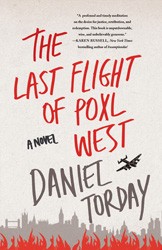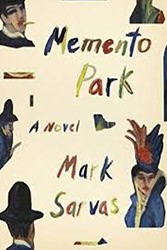
Kim Sherwood’s debut novel, Testament, tells the story of a young woman whose beloved grandfather dies, triggering her quest to find the truth of his past. A Jewish native of Budapest, Joseph Silk is forever changed by the Holocaust, and the effects of his experience and the choices he makes afterward weave together themes of survival, betrayal, forgiveness, and the redemptive power of art. Sherwood recently answered some questions about her novel.
Amy Spungen: Kim, Testament focuses on the experience of Jews in Central Europe, especially Hungary, during the Holocaust. Can you tell us why you chose this geographic area? Is this story personal for you?
Kim Sherwood: My paternal grandmother is a Hungarian Jewish survivor, and she lived with us in London while I was growing up. We’ve always been very close, but she only began talking about her experiences a few years ago. I wanted some way to understand what she went through, so I began researching the Holocaust in Hungary. The novel grew from there. Though it’s not my grandmother’s story — because, of course, that’s hers to tell — writing about Hungary helped me to articulate my grief at all I was learning, and also to reconnect in a meaningful way with our heritage. I spent a lot of time in Hungary while writing the novel, and now know Budapest as well as I do London.
AS: Toward the beginning of the novel, Joseph Silk’s granddaughter, Eva, reads from what I believe is a J. C. Squire poem titled “Testament” at his funeral. The book ends with Eva reflecting on the same poem: “You wrote your name on the sands when the tide was out, knowing time would come again at the flood. I stand in the breakers.” Eva has learned a lot about her grandfather’s history since his death. Her circling back to this poem from a deeper perspective implies understanding, forgiveness, and love. Can you say something about these interwoven themes? Did you intend to leave readers with a sense of hope?
KS: It’s lovely you’ve pulled that poem out — it was written by J. C. Squire, my maternal great-grandfather, a poet and editor. My maternal grandfather, George, died in 2011, and I read the poem at his funeral. George was like a father to me, and losing him left me unmoored. That poem became a kind of compass for me: I’d return to it, imagining George saying, “Do not think, when you think of me, of a ghost that haunts the lamenting sea.” In the novel, as you said, Eva uncovers her grandfather Silk’s hidden histories, and comes to understand what exactly he left written in the sand.
Writing Testament was part of my grieving process for my grandfather. In those difficult years after his death, I thought a lot about how our relationship with someone we’ve lost doesn’t end when we lose the person. The relationship keeps growing as we grow. Memories are seen in a new light. Though I didn’t set out to end the novel on a note of hope, this feeling gave me hope nevertheless: that though loss might scar us, we heal around the scar, and it becomes part of us, just like that person’s voice and vision is part of us.
AS: In less skilled hands, Eva’s romance with Felix — uniting English Jew with German gentile — could have become a trite device symbolizing the progress of enlightenment. Instead, you portray their growing interest in each other realistically, sensitive to their personal and cultural baggage. Can you talk about how you envisioned these two characters? Did their relationship evolve as you wrote the book, or did you have a clear picture of their roles from the start?
KS: Thank you, that’s very kind. Felix took me completely by surprise. Initially, he was just the voice at the end of the phone when Eva calls the Jewish Museum Berlin to find out more about the witness testimony left by her grandfather. But I enjoyed Felix’s voice, and he made me laugh, so I thought I’d write one scene between Felix and Eva at the museum. And then he wouldn’t go away!
AS: Silk’s eyesight is forever altered by a beating. Ultimately, he turns this affliction to his advantage, creating art that brings him fame. But in another way his vision fails him — it’s difficult for him to truly empathize with others, to see things from their perspectives. What made you decide to use eyesight in both a literal and figurative sense?
KS: The initial idea came from a passage in Alexandr Solzhenitsyn’s One Day in the Life of Ivan Denisovich, in which the protagonist is struck by the beauty of a sunset over the gulag. I began to think about perception shaped by trauma. As I started writing the novel, there was the terrible mine collapse in Chile. News reports suggested the men’s eyesight might be damaged. I was also researching the Bor mines in Serbia, where the Hungarian forced labor service used Hungarian Jews and others as slave labor. I called up the Royal National Institute for Blind People and talked with them about eyesight damage, and the ideas came together to create Silk’s eyesight. Silk emerges from the mines only able to see the color blue, which, as you say, fuels his abstract expressionism. But it’s also a metaphor, of course — he recreates his life after the Holocaust, cutting away his past. He forces those around him to become an audience to his star performance, which involves a willing blindness on his part to the pain this causes his family. But the blue of the Danube always follows him — he can’t escape his past.
AS: One of the most riveting aspects of your novel for me was your use of some of the actual questions asked of survivors by the Hungarian National Committee for Attending Deportees (DEGOB) in 1945 to guide readers into the sections of Testament. What inspired you to use these questions the way you did?
KS: I visited the Jewish Museum Berlin in 2011, and was really struck by the voids — inaccessible concrete shafts that cut through the museum. I began to think about the voids as tunnels from past to present that we can never fully traverse, just as we can’t bring the dead back — but that narrative can traverse. In my research, I discovered and was transfixed by the DEGOB questions, which reflect how much our understanding — of everything from death to history — was about to change. The interviewers first asked the survivors if they experienced or witnessed any crimes or violence, what methods were used to kill people. Then they moved from past to present tense, asking survivors where they intended to go next, how they planned to rebuild their lives. I saw the questions as a kind of ladder I could drop into the void, allowing the narrative to move between past and present. The questions divide the historical and present-day timelines, but also link them.
AS: How long did it take you to write Testament? Did you find any surprises along the way?
KS: Six years. Like a lot of people, I grew up with a generally good understanding of the Holocaust. But as I began to research deeper into the history, I found myself shocked again and again, despite everything I’d already learned. There’s a line from Anne Michaels’s Fugitive Pieces: “Two wars, which are both the rotten part of the fruit that can’t be cut away and the fruit; that there’s nothing a man will not do to another; nothing a man will not do for another.” One thing that surprised me in regard to the UK’s relationship with the Holocaust was how deeply suspicious and xenophobic many people were towards refugees, some believing them to be German spies, some simply hating the idea of “aliens.” I was struck by how much this resonates with the UK’s relationship to refugees today. I always knew, of course, that many people didn’t want to accept any Jewish refugees to the UK. But because we hold up the Kindertransport as a totem of our accepting nature, I had been lulled into believing a larger national narrative of open arms. While doing research for the novel, I read a lot of advice pamphlets for refugees, which advised them to speak English at all times, avoid speaking of the trauma they had endured, and to become as English as possible. I was also struck by the level to which the Anglo-Jewish community funded missions to rescue and financially support refugees, forming charities and lobbying a reluctant government and population.
AS: Were any of the characters particularly challenging for you? Why?
KS: I found Eva the most challenging character to capture on the page. Her voice resisted me for a long time. I began writing her sections in third person. Traveling around Berlin and Budapest, I’d make notes from her point of view in first person, and then change them to third as I drafted the novel. I wrote about 70,000 words that way, but Eva’s voice was still resisting me. So I wrote a letter to myself from Eva about how she felt about being invented. She was furious with me. She felt like I’d brought her to life in this moment of great grief, and then left her stuck there, unable to speak for herself. It had to be in first person. So I started again.
AS: Can you tell us a bit about your next novel, set in southwestern England? When can we expect it?
KS: I’m really excited to have just received support through a grant from the Society of Authors Foundation to help me write my second novel, A True Relation. Drawing on adventure fiction, the literature of roguery, and travel and life writing, the novel explores issues of gender, genre, and place in South West England. The main thread of the novel is a subversion of the smuggling tale, intercut by century-spanning conversations between male and female writers who either visited or lived in Devon. By placing these national figures – including Celia Fiennes and Daniel Defoe, Hester Thrale and Samuel Johnson, George Eliot and Charles Dickens – in conversation, I hope to explore the portrait they paint of the UK, and the complexities they reveal about our national story. I’m going to say it will be out in 2020, and maybe that will manifest a finished draft!
Amy Spungen, a freelance editor and writer, has a BS in journalism from Virginia Commonwealth University and an MA in English from Northwestern University. She lives near Chicago in Highland Park, Illinois.



